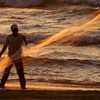
B’Tselem’s research indicates that, since the abduction of Cpl. Gilad Shalit, on 25 June 2006, Israel has forbidden boats, including fishing boats, to sail off the Gaza coast. The prohibition has struck a severe blow to the fishing sector, which provides a livelihood for tens of thousands of residents of the Gaza Strip. Lacking other means of employment, and despite the Israeli navy’s patrol of the coast and occasional shooting at Palestinian fishermen, some fishermen have risked their lives and violated the prohibition. Read more about Israeli army prohibits fishing off Gaza coast and abuse fishermen

I live with my family near the Pisgat Ze’ev settlement. The Separation Barrier separates my house from the rest of the village of Hizmeh. I go to school in a-Ram and am in the eleventh grade. Last Tuesday [23 January 2007], around 7:00 P.M., I left home to go and visit my uncle ‘Abd al-Wali ‘Askar, who lives in Hizmeh. I went by foot, crossed the Hizmeh checkpoint and continued along the Hizmeh-‘Anata road. From my house to my uncle’s house is about one and a half kilometers. I walked slowly, and got to the road leading to his house at about 7:30. Read more about Settlers abuse Ra'fat 'Askar, 16, imprison him and beat him
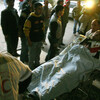
Today, B’Tselem is publishing the findings of its investigation into the action by undercover forces that went awry in Ramallah on 4 January. During an operation to arrest wanted Palestinians, the undercover forces were exposed, resulting in a confrontation with Palestinians who threw stones and petrol bombs at the Israeli undercover and rescue forces, who responded with gunfire. Attack helicopters used machinegun fire to provide cover to the rescue operation. B’Tselem also received reports of gunfire by armed Palestinians. During the operation, Israeli security forces killed four Palestinians. Read more about B'Tselem: Stop using undercover forces in combat actions
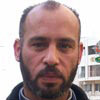
The following is testimony given by ‘Adnan a-Shtiyeh, a taxi driver, on 13 December 2006 to the Israeli human rights organization B’Tselem: I am a taxi driver. I run the route between our village and Nablus. Yesterday (Tuesday, 12 December), around 1:30 P.M., I got to the area known as al-Muhalal, about one kilometer from Nablus. There I encountered about eight army jeeps and an Israeli bulldozer. They were parked in the middle of the road, and nobody could pass. Before dawn, an explosive charge laid by activists had blown up when an army jeep passed. Read more about Patient died when soldiers blocked the direct route to hospital
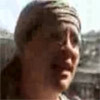
The Israeli human rights organization B’Tselem calls on Israeli authorities not to make the settler, Yifat Alkoby a scapegoat for law enforcement failures in the West Bank. Alkoby was summoned for questioning following the extensive airing of a B’Tselem video in which she is seen assaulting and swearing at women and girls from the Abu-‘Ayesha family, in Tel Rumeida, Hebron. The incident, as grave as it is, is only the tip of the iceberg of the daily violence committed by Hebron settlers, against their Palestinian neighbors, under the protection of the army. Read more about Videotaped Hebron settler violence just the tip of the iceberg
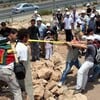
On 19 November 2006, the commander of IDF forces in the West Bank, Major-General Yair Naveh, issued an order prohibiting Israelis and tourists from using their vehicles to transport Palestinians in the West Bank without a permit from the army. The order is to take effect on 19 January 2007. The order does not apply to Palestinians who hold a permit to enter Israel or the settlements, to Israeli bus drivers, Israel residents carrying Palestinians who are first-degree relatives, and soldiers and police officers on duty. Read more about B'Tselem: Repeal order forbidding transport of Palestinians in Israeli vehicles
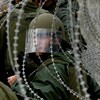
This past year, we witnessed a deterioration in the human rights situation in the Occupied Territories, particularly in the increase in civilians killed and the destruction of houses and infrastructure in the Gaza Strip. At the same time, there was an improvement regarding violations of the right to life of Israeli civilians. According to B’Tselem’s research, from January to December 27, 2006, Israeli security forces killed 660 Palestinians in the West Bank and in Israel. This includes 141 minors. At least 322 of those killed did not take part in the hostilities at the time they were killed. Read more about 683 people killed in the conflict in 2006
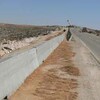
The High Court of Justice accepted the petition filed by the Association for Civil Rights in Israel on behalf of Palestinians from the southern Hebron hills to remove a concrete barricade that Israeli security forces had built. The forty-one-kilometer barricade runs from the Tene settlement in the west to the Carmel settlement in the east. The eighty-two centimeter high barricade makes it impossible for vehicles to cross. Read more about High Court orders dismantling of concrete barricade in the southern Hebron hills
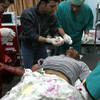
On Thursday, 14 December, at around 10:45 in the morning, an Israeli soldier shot to death Wahib a-Dik, a twenty-eight-year-old Palestinian laborer, and father of four. The IDF Spokesperson issued no statement on the incident. The press quoted anonymous military sources who said that a-Dik was shot by a Paratrooper Unit that entered a courtyard in a-Dik Village while chasing youths who had thrown stones. According to these sources, “the company commander saw a-Dik about to throw a brick at soldiers from the top of a flight of stairs. The commander fired two shots at the man, killing him.” Read more about Soldier shoots and kills construction worker in Kufr A-Dik village
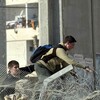
On 13 December 2006, the High Court of Justice rejected the petition filed by the Association for Civil Rights in Israel and the human rights organization Bimkom against the section of the separation barrier that severs the Palestinian community a-Ram from East Jerusalem. According to the head of the local council, the community has about 58,000 residents, half of whom hold Israeli identity cards.
This section of the barrier will surround a-Ram on three sides. The barrier’s route will separate a-Ram from its last land reserves, and leaves this area on the Israeli side of the barrier. Read more about High Court approves cutting off a-Ram from East Jerusalem









